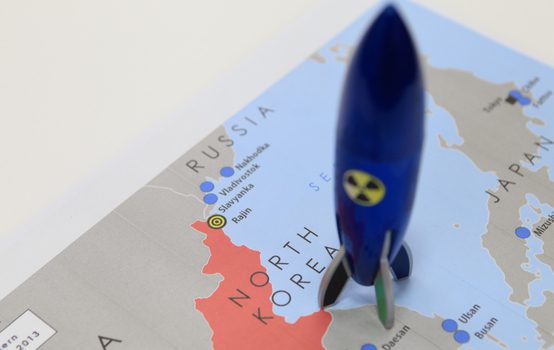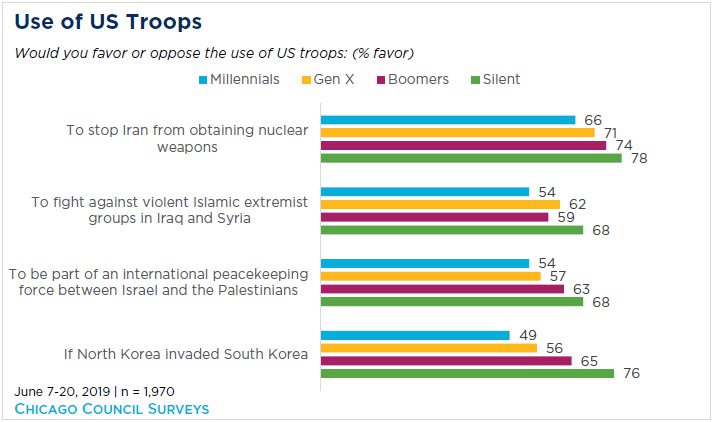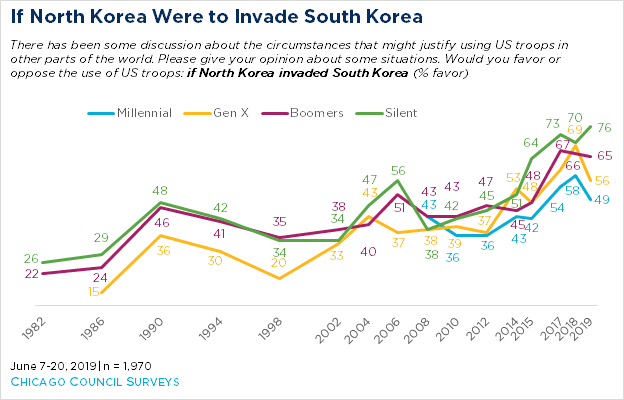How Threat Inflation Warps Public Opinion

The Chicago Council on Global Affairs has released more findings from its survey of American public opinion on foreign policy. Most of the findings are consistent with what we have seen before: there is a significant generational gap in support for an activist and interventionist U.S. foreign policy, and Millennials are less likely to support U.S. military action in various scenarios than older cohorts. They are also least likely to say that they favor an “active role” in global affairs.
A majority of Millennials still supports having such a role (62%), but that is twenty-one points lower than the oldest cohort. The two oldest cohorts, the Silent and Boomer generations, are not only more supportive of this “active role” than younger Americans, but they are much more likely to support this than they were forty years ago. Bizarrely, these cohorts have become more supportive of an “active role” in the world during the same period when the U.S. has engaged in some of its costliest and most futile foreign misadventures. 83% of Silent generation respondents support this “active role” today, and only 58% supported it in 1982. 74% of Boomers support this role now, but just 59% supported it in 1978. One would think that the debacle in Iraq and the futility of all of the wars over the last twenty years would diminish their confidence in an activist foreign policy, but instead there has been an increase since the start of the century. The story is much the same with the Gen X cohort: in 1998, only 49% agreed with the “active role” option, and today the number stands at 69%. All of these cohorts tend to become more supportive of an “active role” as time goes by regardless of how much damage U.S. activist foreign policy does.
The most troubling result is the broad public support for military action to “stop Iran from obtaining nuclear weapons”:

It is remarkable that there is less support for coming to the defense of a treaty ally when it is invaded than there is for attacking Iran in an illegal, preventive war. The good news is that Iran is not seeking nuclear weapons, so this scenario is not likely to happen, but it is very worrisome that there is such an unthinking consensus in favor of an unjustified and aggressive military option. When the cohort that is least supportive of military action still favors launching an illegal attack on another country by two-to-one, that shows just how much public opinion has been warped by constant fear-mongering and threat inflation about Iran.
Looking at the responses to the North Korea question over the decades, it is striking how little support there used to be for defending South Korea even during the Cold War. Over the last forty years, there has been a huge increase across the oldest three cohorts in a willingness to fight another war in Korea:

Some of this increase might be explained by the demise of the USSR, but it cannot account for the dramatic increase in the last twenty years. There have been double digit increases in support for using U.S. forces to respond to a North Korean invasion since 2002, and in some of the cohorts the increase has been huge. 33% of Gen X respondents favored using U.S. troops in this scenario 18 years ago, and now 56% do. 34% of Silent generation respondents gave this response in 2002, and it is now 76%. 38% of Boomers gave this answer at the start of the century, and now 65% back using U.S. troops in a new Korean war. The sharpest increases seem to be related to North Korea’s acquisition of nuclear weapons. This is strange, since one wold think that North Korea’s possession of nuclear weapons would make Americans less likely to want to get involved in a war on the Peninsula. Once again, it looks like public opinion on this question has been driven by the steady drumbeat of fear-mongering about a manageable, deterrable threat from the DPRK. It is interesting that the generation that has grown up with the most threat inflation about Iran and North Korea is also the generation least inclined to use force against them. It may be that the generation that came of age with 9/11 and the Iraq war are understandably more skeptical of official claims and more likely to discount alarmism about foreign threats. Whatever the reason, it is encouraging that younger Americans are less supportive of military options, and if they stick with these views that bodes well for the prospects of a more restrained and peaceful foreign policy in the decades to come.
Comments